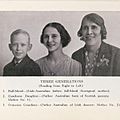Stolen Generations facts for kids
The Stolen Generations refers to the Aboriginal and Torres Strait Islander children in Australia. These children were sadly taken away from their families by government groups and church missions. This happened because of different rules and policies. This practice mostly took place from about 1905 to 1967, but in some places, it continued into the 1970s.
Contents
Why Were Children Taken?
The main reason these children were removed was due to something called assimilation policies. These policies aimed to make Aboriginal people live like the white European settlers. People in power believed that Aboriginal people would either disappear or be better off if they joined the main culture. Children who had both Aboriginal and non-Aboriginal parents were often targeted. It was thought they could more easily fit into white society.
How Children Were Removed
Children were taken from their homes and placed in special homes, foster care, or adopted by non-Indigenous families. They often faced difficult situations and were not allowed to connect with their own culture, language, or families. The people in charge said they were protecting the children. However, these actions caused a huge loss of culture and family connections for many Indigenous people.
Lasting Effects of the Removals
The impact of these policies has been very deep and long-lasting. It led to something called intergenerational trauma. This means that the pain and sadness affected not only the people who were taken but also their children and grandchildren. It created a cycle of emotional and mental distress. We don't know the exact number of children removed. But in some areas, it's thought that between one in ten and one in three Indigenous children were affected.
Saying Sorry: Recognition and Apology
More people learned about the Stolen Generations in the late 1900s. This was partly thanks to activists who worked hard to share their stories. Also, a report called "Bringing Them Home" was released in 1997. This report, from the Australian Human Rights and Equal Opportunity Commission, explained the policies and their terrible effects on Indigenous communities.
In 2008, Australian Prime Minister Kevin Rudd officially apologized to the Stolen Generations. He did this on behalf of the Australian government. He admitted that great wrongs had been done to Indigenous peoples.
Challenges That Remain
Even with the official apology and more people knowing about the Stolen Generations, many suggestions from the "Bringing Them Home" report have not been fully put into action. The effects of these policies still impact Indigenous communities today. There are ongoing issues like cultural disconnection. Also, a high number of Indigenous children are still in state care.
Images for kids
-
A diagram from A. O. Neville's book, showing the idea of "breeding out" Aboriginal features.
-
People gathering for National Sorry Day in Brisbane in 2016, remembering the mistreatment of Indigenous Australians.
-
Kevin Rudd's apology to the Stolen Generations shown on a screen in Melbourne.
See also
 In Spanish: Generaciones robadas (Australia) para niños
In Spanish: Generaciones robadas (Australia) para niños
 | Charles R. Drew |
 | Benjamin Banneker |
 | Jane C. Wright |
 | Roger Arliner Young |




